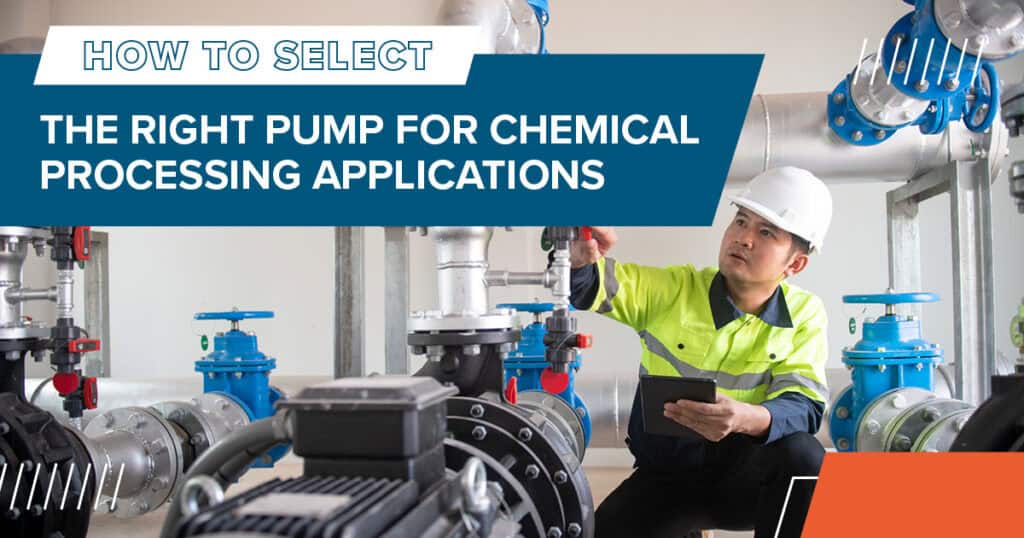Finding the right pump for chemical processing applications is a critical step because of the unique challenges involved in handling various chemicals. These highly specialized applications often require pumps that can withstand harsh environments, prevent contamination, and ensure safe and efficient operation. The proper pump can enhance process reliability, reduce maintenance costs, and improve safety.
Challenges of Pumping Chemicals
Pumping chemicals involves numerous challenges that must be considered when selecting equipment. Some of these challenges include:
- Corrosion—Many chemicals are corrosive and can degrade the pump’s materials over time. This may lead to leaks, mechanical failure, and potentially hazardous situations.
- Viscosity and Abrasiveness—Chemicals can vary widely in viscosity and abrasiveness. Thick or abrasive chemicals require specific pumps and configurations to ensure smooth operation and reduce wear and tear.
- Temperature Extremes—Certain chemicals are processed at very high or low temperatures, and the pump equipment must be able to function properly under these conditions without damage to its components.
- Safety Concerns—Leaks or spills in chemical processing can be dangerous, especially with volatile or toxic substances. Ensuring a safe and leak-free design is essential for both worker safety and environmental protection.
- Compatibility with Chemical Properties—Different chemicals have unique properties such as pH levels, reactivity, and toxicity. The type of chemical may necessitate specialized pump materials and coatings to avoid contamination or degradation.
Selecting the Best Chemical Pump Type
When selecting a pump for chemical processing, consider these essential factors:
Understand the Chemical Characteristics
Begin by assessing the specific chemicals involved. Knowing the chemical’s corrosiveness, viscosity, temperature, and other properties will inform your choice of pump type and materials. For example, acids and alkalis require corrosion-resistant materials, while high-viscosity fluids need a pump with appropriate suction power and flow rate.
Choose the Right Pump Type
Different pump types are suited for various chemical processing tasks:
- Centrifugal Pumps—Centrifugal chemical pumps are ideal for low-viscosity fluids and continuous, high-flow applications. These pumps are common in chemical processing but may not be suitable for highly viscous or abrasive chemicals.
- Positive Displacement Pumps—Positive displacement (PD) pumps are generally best for handling thick, abrasive, or shear-sensitive chemicals. These pumps provide a consistent flow rate and are highly effective in applications where precise fluid handling is critical.
- Diaphragm Pumps—Diaphragm pumps are often used for handling hazardous and volatile chemicals. Pumps with diaphragm-based designs provide leak-free performance and can manage a variety of chemical viscosities and temperatures.
Select Appropriate Materials
When it comes to chemical pump selection, another important factor is selecting the proper equipment materials. Pump housings, seals, and key internal components must be suited to handle the chemicals being pumped.
- Stainless Steel—Stainless steel provides excellent corrosion resistance for many chemical applications but may not be best for highly acidic substances.
- Thermoplastics—Materials like polypropylene and polyvinylidene fluoride (PVDF) are lightweight and highly resistant to corrosive chemicals, making them an excellent option for highly aggressive fluids.
- Elastomers—Materials such as ethylene propylene diene monomer (EPDM) or Viton are used for seals and gaskets. It’s essential to ensure these materials are compatible with the chemicals being pumped to avoid leaks or degradation.
Consider Pump Coatings and Linings
For additional protection, applying specialized coatings or using pumps with chemical-resistant linings can prolong pump life and improve efficiency. Ceramic coatings, for instance, can increase the pump’s durability when handling abrasive chemicals.
Ensure Proper Configuration
Selecting the right pump configuration ensures smooth operation. Pumps designed for chemical processing often feature double-seal systems, closed-loop systems, or magnetic drives to prevent leaks and ensure safe handling of hazardous substances.
Selecting the appropriate pump for chemical processing applications requires careful consideration. It helps to work with a pump expert who can take the time to understand your specific chemical processing challenges and match you with the best pump for the job. This is exactly what we do at DXP Pacific. Our knowledgeable team of engineers can assist you with all aspects of pump equipment selection, custom system configuration, and ongoing pump management services. Contact us today to learn more.

